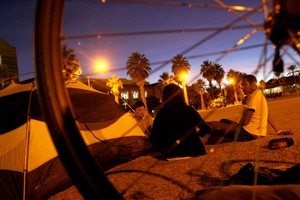UA students exchanged their cell phones and televisions for tents and scraps of food in a simulation of homelessness that began Monday and ends today.
“”Our mission is … to get beyond the stigma that every homeless person is the dirty bum on the side of the street that asks you for money to go buy booze. There’s so many different aspects of homelessness, there’s so many different issues and causes and it’s going to increase with the foreclosure rate, with the down economy. … It’s just going to increase and have an even larger problem on our hands,”” said sociology junior and Social Justice League president Hali Nurnberg.
“”Tentropolis”” consists of about 20 students, all members of the Social Justice League, who have set up tents on the UA Mall and must remain within the small area. Students can leave for work and classes, but must do their best to let the homeless circumstance envelop them.
“”(Students) give up their phone, their computers, their iPods, their lattes, their gourmet food – whatever it is, they give it up,”” Nurnberg said.
The group has even set up a soup kitchen with restaurants in the Student Union Memorial Center, so the students can go in and eat the buffet’s leftovers.
Students remain on the Mall until 10 p.m. when they pack up all their items and sleep in the Gittings gym, where a mock shelter has been created for the simulation.
“”It has definitely taken me out of my comfort zone: It has been cold, been different … going to bed at 11:30 and up at 6 (in the morning) and exposed to the elements all day. … It’s rough and I know this is nothing compared to actually living on the streets, and I already want to go home,”” said interdisciplinary studies junior Alexandria Weber.
Former UA, now Pima Community College student, Simone Reynolds said he was surprised to discover that some UA students are currently homeless:
“”A guy actually yesterday … said he lives in his car. All his money went to tuition. So he lives in his car and he ducks from the police on a nightly basis, trying to find somewhere he can go that’s safe and they won’t kick him out. … So hearing those stories and imagining that someone who is walking by with their backpack going to class, could (actually) be going home to their car.””
During the simulation, Reynolds said homeless persons approached their setup and said, “”This seems like a really safe spot. Do you know where I can go to be safe?””
Sometimes the homeless would even ask where the students were sleeping that night.
“”It’s really hard because you can tell that they’re really desperate and they want somewhere they can go (and be) safe,”” Reynolds said.
While most of the student reaction to the simulation has been mixed, Weber said she hoped students willtry to understand the homeless situation.
“”I’m hoping that students will realize that homelessness isn’t as detached from society as we would really like to believe, and it can happen to anybody and it can happen very easily. Having a college education doesn’t guarantee you won’t end up on the streets; having three cars and a sweet house and a $50,000-a-year job doesn’t guarantee that you will never end up on the streets needing someone else to provide you with kindness and humanity,”” Weber said. She added that some people are detached from the situation and say, “”Oh, they’re just a homeless person. They choose that way.”” But “”it could very easily be you someday.””
Reynolds agreed, saying you don’t have to change your life to help, but rather, “”thought after thought kind of works into being something that makes a difference.””









